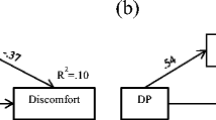Abstract
In this study, we hypothesized that (1) Latina and Asian American undergraduate women would report more frequently fulfilling family obligations than would European Americans, and (2) fulfillment of family obligations would predict students’ residential and working plans for their first semester of college. Results of an online survey completed by 296 American first-year students showed that Latinas more frequently fulfilled family obligations than did Asian Americans and European Americans, although fulfilling family obligations did not influence Latinas’ residential or working plans. European American students who more frequently fulfilled family obligations were more likely to plan to live at home, and Asian American students who more frequently fulfilled family obligations planned to work fewer hours during their first semester at college.
Similar content being viewed by others
References
Arnett, J. J. (2001). Conceptions of the transition to adulthood: Perspectives from adolescence through midlife. Journal of Adult Development, 8(2), 133–143.
Bachman, J. G., Safron, D. J., Sy, S. R., & Schulenberg, J. E. (2003). Wishing to work: New perspectives on how adolescents’ part-time work intensity is linked to educational disengagement, substance use, and other problem behaviors. International Journal of Behavioral Development, 27, 301–315.
Bronfenbrenner, U., & Morris, P. A. (2006). The bioecological of developmental processes. In R. W. Damon, & M. Lerner (Eds.) Handbook of child psychology: Theoretical models of human development(vol. 1, 6th ed.). Hoboken, NJ: Wiley.
Cammarota, J. (2004). The gendered and racialized pathways of Latina and Latino youth: Different struggles, different resistances in the urban context. Anthropology & Education Quarterly, 35(1), 53–74.
Chao, R., & Tseng, V. (2002). Parenting of Asians. Mahwah, NJ: Erlbaum.
Cote, J. E. (2000). Arrested adulthood: The changing nature of maturity and identity. New York: New York University Press.
Field, A. (2005). Discovering statistics using SPSS. Thousand Oaks, CA: Sage.
Fuligni, A. J., & Pedersen, S. (2002). Family obligation and the transition to young adulthood. Developmental Psychology, 38, 856–868.
Fuligni, A. J., Tseng, V., & Lam, M. (1999). Attitudes toward family obligations among American adolescents with Asian, Latin American, and European backgrounds. Child Development, 70, 1030–1044.
Fuligni, A. J., Witkow, M. R., & Garcia, C. (2005). Ethnic identity and academic motivation among adolescents from immigrant families. Paper presented at the Society for Research in Child Development, Atlanta, GA.
Ginorio, A., Gutiérrez, L., Cauce, A. M., & Acosta, M. (1995). Psychological issues for Latinas. In H. Landrine (Ed.) Bringing cultural diversity to feminist psychology: Theory, research, and practice (pp. 241–263). Washington, DC: American Psychological Association.
Jordyn, M., & Byrd, M. (2003). The relationship between the living arrangements of university students and their identity development. Adolescence, 38, 267–278.
Lugones, M. C., & Spelman, E. V. (1990). Have we got a theory for you!: Feminist theory, cultural imperialism and the demand for ‘The Woman’s Voice’. In A. Y. al-Hibri, & M. A. Simons (Eds.) Hypathia reborn: Essays in feminist philosophy (pp. 18–33). Bloomington: Indiana University Press.
Marín, G., & Marín, B. (1991). Research with Hispanic populations. Newbury Park, CA: Sage.
Markus, H. R., & Kitayama, S. (1991). Culture and the self: Implications for cognition, emotion, and motivation. Psychological Review, 98, 224–253.
Marshall, C., & Rossman, G. B. (1999). Designing qualitative research (3rd ed.). Thousand Oaks, CA: Sage.
Mooney, S. P., Sherman, M. F., & lo Presto, C. T. (1991). Academic locus of control, self-esteem, and perceived distance from home as predictors of college adjustment. Journal of Counseling & Development, 69, 445–448.
Pascarella, E. T., Edison, M. I., Nora, A., Hagedorn, L. S., & Terenzini, P. T. (1998). Does work inhibit cognitive development during college? Educational Evaluation and Policy Analysis, 20(2), 75–93.
Raffaelli, M., & Ontai, L. L. (2004). Gender socialization in Latino/a families: Results from two retrospective studies. Sex Roles, 50, 287–299.
Rodriguez, A. L., Guido-DiBrito, F., Torres, V., & Talbot, D. (2000). Latina college students: Issues and challenges for the 21st century. NASPA Journal, 37, 511–527.
Stevens, J. (1996). Applied Multivariate Statistics for the Social Sciences (3rd ed.). Mahwah, NJ: Erlbaum.
Suárez-Orozco, C., & Suárez-Orozco, M. M. (2001). Children of immigration. Cambridge, MA: Harvard University Press.
Sy, S. R. (2006). Family and work influences on the transition to college among Latina adolescents. Hispanic Journal of Behavioral Sciences, 28, 368–386.
Tseng, V. (2004). Family interdependence and academic adjustment in college: Youth from immigrant and U.S.-born families. Child Development, 75, 966–983.
Vázquez García, H., García Coll, C., Erkut, S., Alarcón, O., & Tropp, L. (2000). Family values of Latino adolescents. In M. Montero-Sieburth, & F. A. Villarruel (Eds.) Latino adolescents: Building upon Latino diversity (pp. 239–264). New York: Garland.
Vega, W. A. (1990). Hispanic families in the 1980s: A decade of research. Journal of Marriage and the Family, 52, 1015–1024.
Watts, C. (2002). The effects of term-time employment on academic performance. Education and Training, 44, 67–75.
Watts, C., & Pickering, A. (2000). Pay as you learn: Student employment and academic progress. Education and Training, 42, 129–134.
Woosley, S. A. (2003). How important are the first few weeks of college? The long term effects of initial college experiences. College Student Journal, 37(2), 201–207.
Author information
Authors and Affiliations
Corresponding author
Rights and permissions
About this article
Cite this article
Sy, S.R., Brittian, A. The Impact of Family Obligations on Young Women’s Decisions During the Transition to College: A Comparison of Latina, European American, and Asian American Students. Sex Roles 58, 729–737 (2008). https://doi.org/10.1007/s11199-007-9385-z
Received:
Accepted:
Published:
Issue Date:
DOI: https://doi.org/10.1007/s11199-007-9385-z




